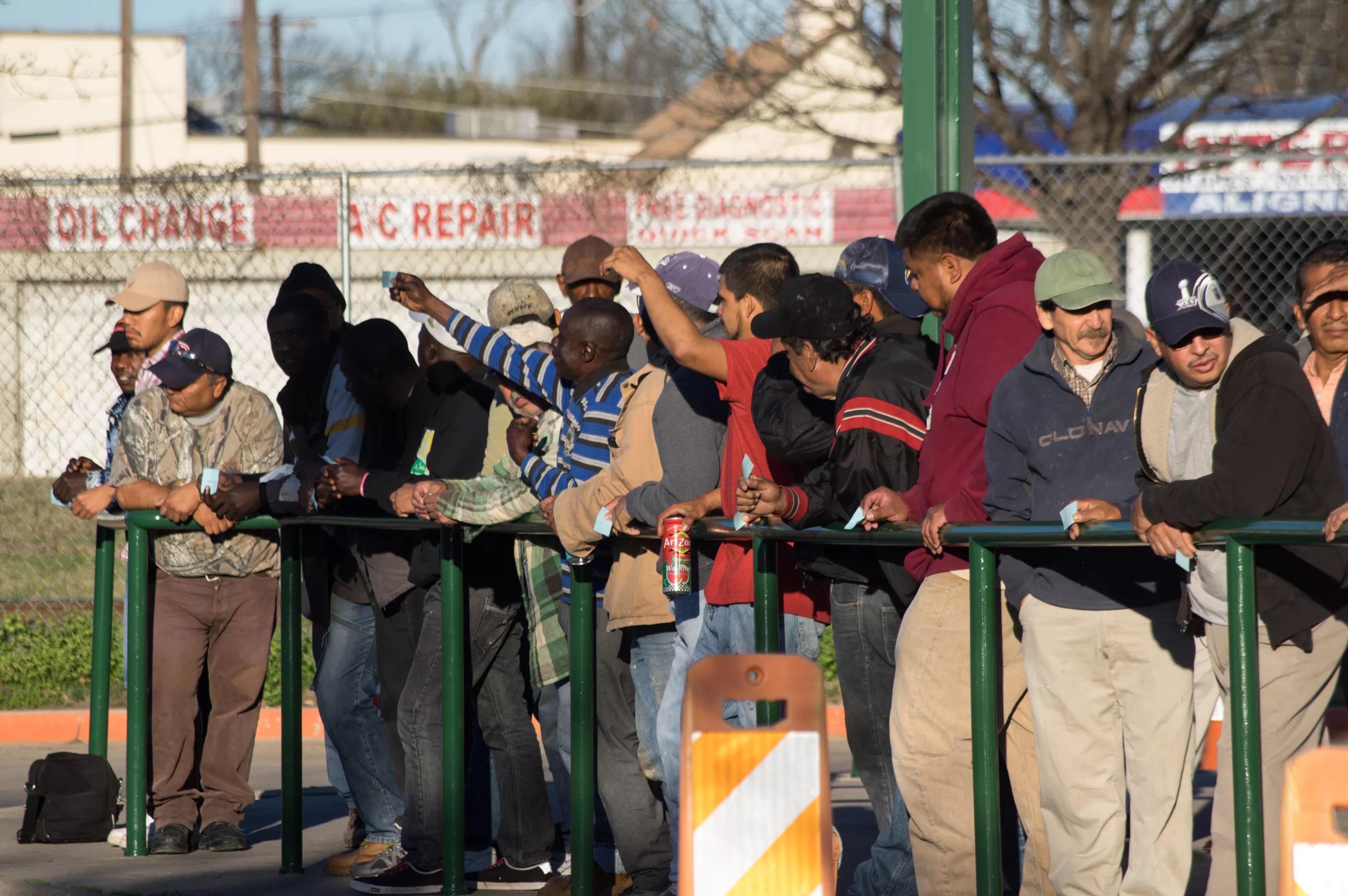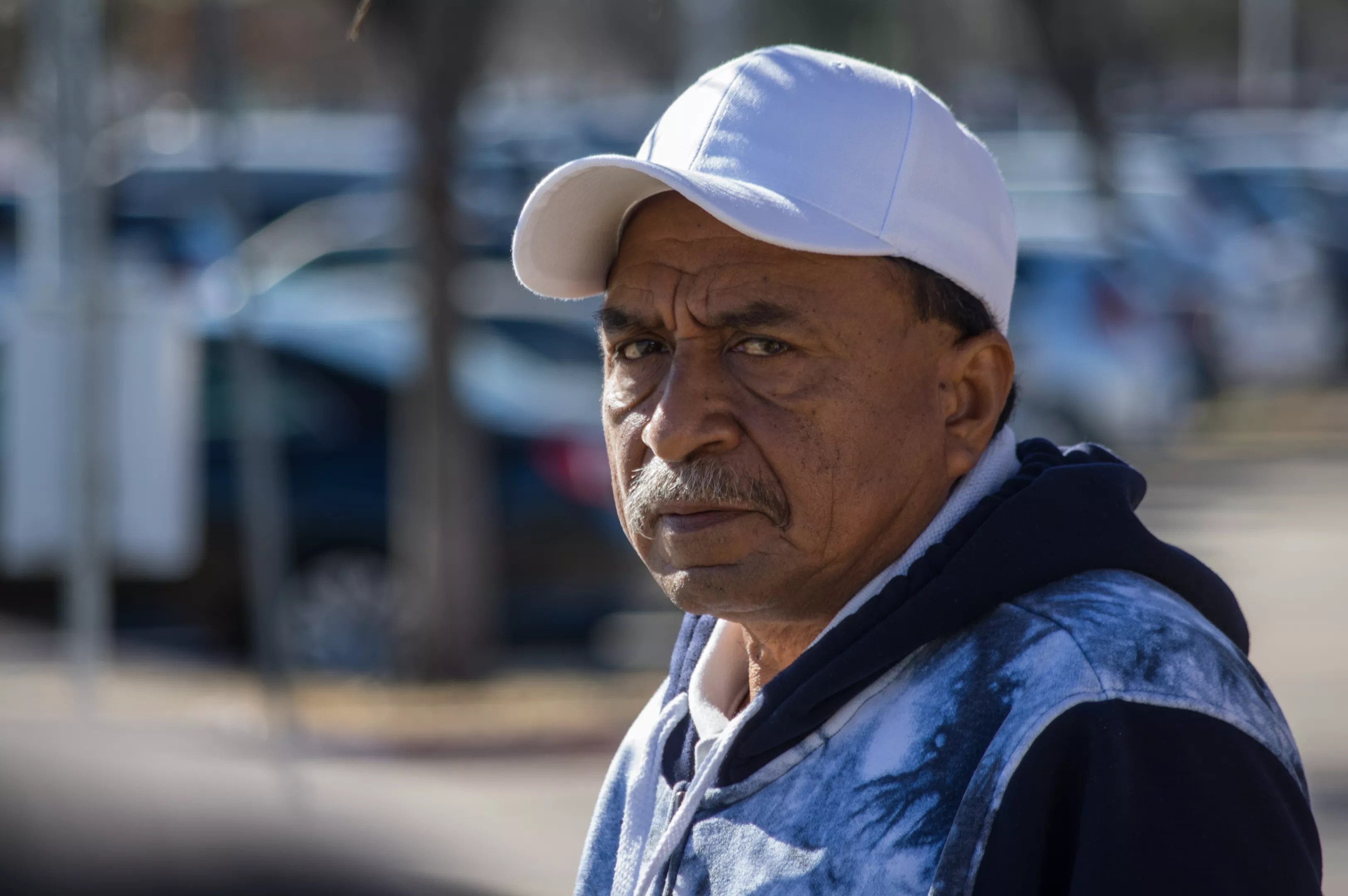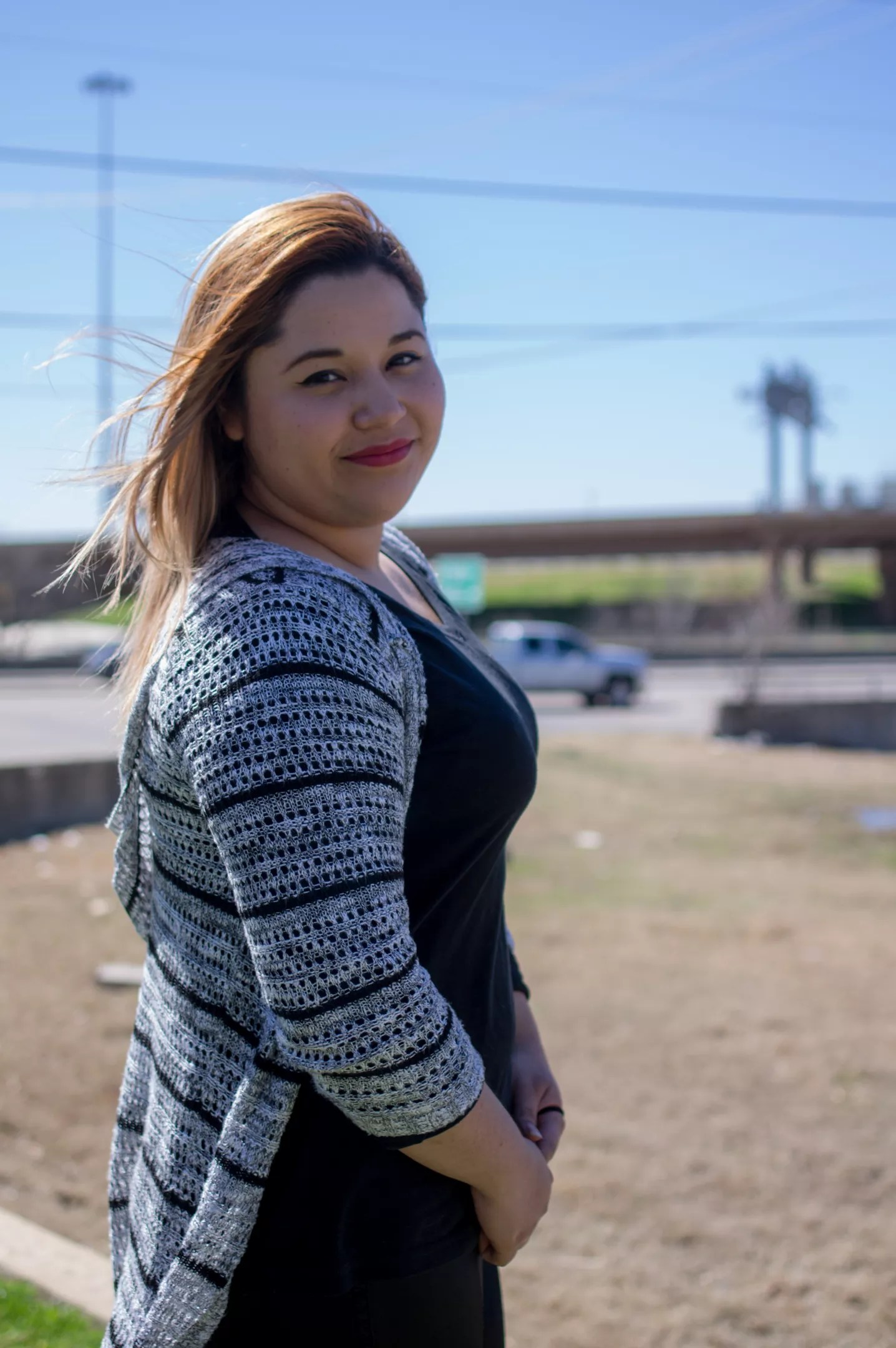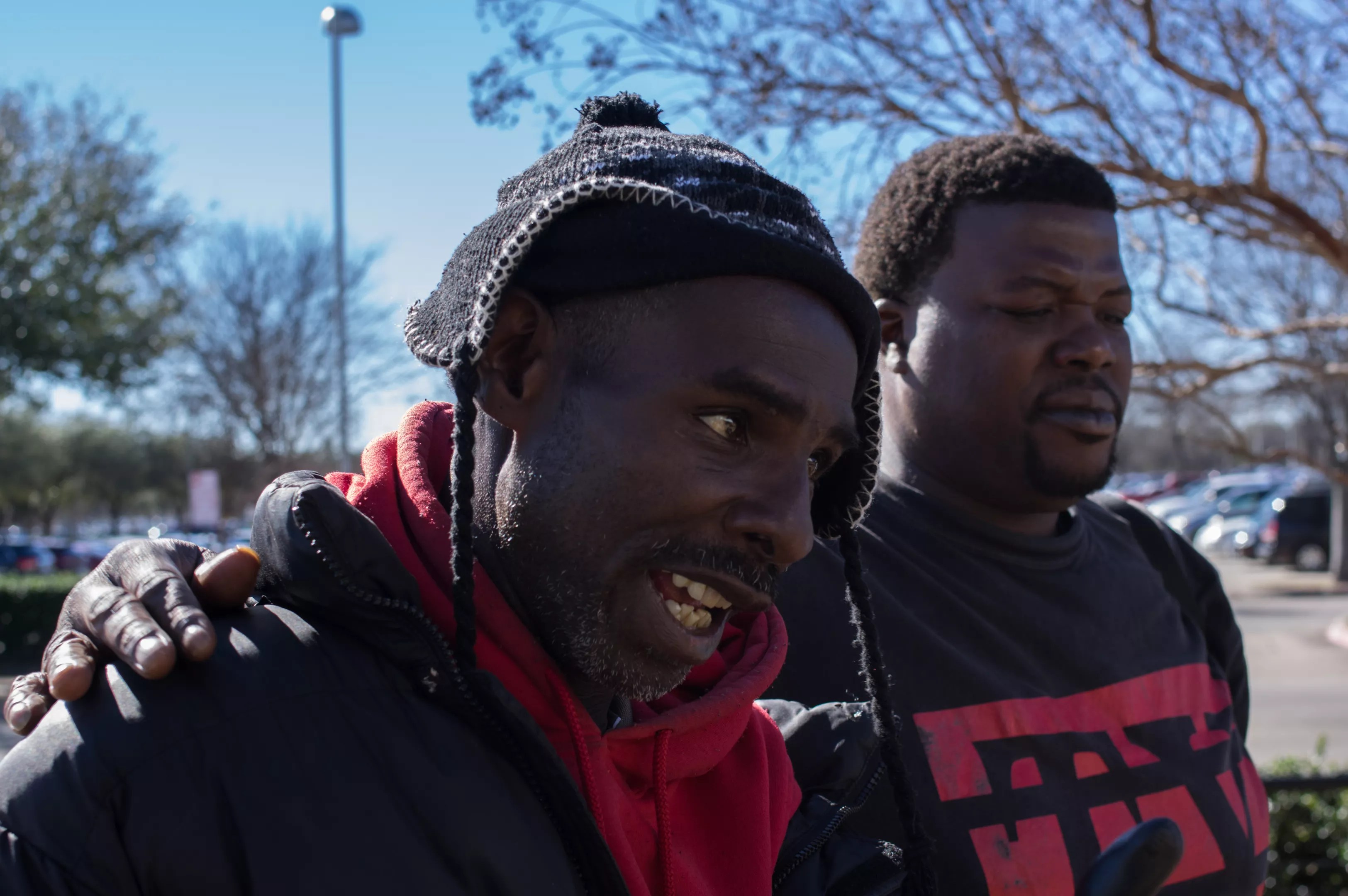
Matthew Brown

Audio By Carbonatix
Leroy Coleman and Joseph Sanders have a simple response to the recent, sweeping federal order dictating federal agencies be more aggressive in deporting undocumented immigrants: It’s about damn time.
Coleman and Sanders are day laborers who see the effects of U.S. immigration policy first hand as they compete for low-wage temporary jobs. From where they stood outside Plano’s day labor center on an early morning last week, help from Washington can’t come soon enough. Since joining the Trump administration, Homeland Security Secretary John Kelly has called for a stricter stance of immigration enforcement and deportations.
“They still outnumber us three to one,” says Coleman, 55, of the Hispanic men who gather at the center, many of them, he assumed, in the United States illegally.
This year, make your gift count –
Invest in local news that matters.
Our work is funded by readers like you who make voluntary gifts because they value our work and want to see it continue. Make a contribution today to help us reach our $30,000 goal!
Coleman once had a regular job at the Pilgrim’s Pride chicken processing facility in Dallas, but the company shut down the plant in 2011. The company said the closure was a cost-cutting measure prompted by the high-cost of chicken feed and an oversupply of chickens.
But Coleman believes there was another reason. The Dallas plant closed about three years after Immigration and Customs Enforcement raided four Pilgrim’s Pride factories nationwide, including one in Mount Pleasant, rounding up hundreds of undocumented immigrants.
“That’s why they’re out of business, for that same shit that’s happening here: hiring illegals,” Coleman says.
Economists might disagree with Coleman’s take on the labor market — or they might not. For every macroeconomic question there seems to be as many answers as there are economists with data sets. The pro-immigration side says low-cost immigrant labor boosts GDP, putting more money into the economy to create more and better jobs for more skilled natives.
“The arrival of undocumented workers with limited English skills frees up low-skill American workers who can then specialize in tasks that require better English,” writes Art Carden, associate professor of economics at Samford University, in an Aug. 28, 2015 article. (The Observer found quote on the website procon.org, a great place for those who enjoy getting both sides of an argument.)
Of course, for a laid-off chicken plant worker reduced to hustling for day labor, snagging that next great job coding Linux may just be an economist’s pipe dream. Down on the street corner job market, where economists on both sides agree the wages are depressed by the arrival of new laborers, the view is less sanguine.
“Because immigration (legal and illegal) increased the supply of workers unevenly, the impact varies across skill groups, with high school dropouts being the most negatively affected group,” George J. Borjas, the Robert W. Scrivner Professor of Economics and Social Policy at the Harvard Kennedy School, reported for the conservative Center for Immigration Studies. “A 10 percent increase in the size of a skill group reduced the fraction of native-born blacks in that group holding a job by 5.1 percentage points. … Immigration has its largest negative impact on the wage of native workers who lack a high school diploma.”
Coleman knows what he sees daily, and having to compete with non-citizens at the bottom of the job market leaves a bitter taste in his mouth.
Coleman and Sanders traveled from Dallas to Plano’s day labor center to put their names on a list for odd jobs that pay cash for a day’s work. The day labor center in Garland would have been closer to home, but it has strict rules that affect how they can barter with employers for better pay. (The Garland center also prohibits laborers from talking to reporters on the site.)
At Plano, the workers have a tacit understanding, he says: Twelve dollars an hour is the going rate for day labor. It’s a rare point of agreement among the men who otherwise separate themselves by race and ethnicity. Latinos stick together, one, two, three in a group, conversing in Spanish. Coleman and Sanders, who are black, linger near other black men needing a job for a day. The whites hang out with other whites.
Jose Pacheco supports Trump even though he’s one of the 11 million undocumented immigrants who could be deported.
Another name is called, and a few of the Spanish speakers climb into the car with their new employer for a day.
“They’re still sending them out even before they send the whites out,” Coleman says. “We are citizens, so we have to go last.”
Sanders, who at age 35 towers over his older companion, claims it’s just another form of racism based on a stereotype people hold: that undocumented Latinos are harder workers and more docile. What the Trump administration is doing with stricter enforcement, however, isn’t racism, he says. It’s putting Americans first.
“The law has been on the books,” he says. “It’s nothing new to us or new to them either. They knew it, but it just wasn’t enforced. It’s nothing new, and it affects everybody, not just the Mexicans, but the Africans and whoever is illegal. You’ve got to go.”
President Trump no doubt would agree, but it’s still a pretty harsh prescription for those undocumented workers who through desperation, misunderstanding or simple procrastination fail to get right with the law until they find themselves arrested and facing deportation, Dallas-based immigration attorney Moises Medina says.
Many who seek Medina’s services crossed the border illegally years ago and now want to become legal residents. There are several ways to qualify, he says. For example, if they married a citizen, or have a relative who’s a citizen. Children born in the U.S. can also petition for their parents’ residency if they’re over the age of 21.
For immigrant families with younger children, however, Kelly’s new guidelines are especially worrying. More aggressive enforcement means it’s likely that some parents of young children born here could find themselves being deported immediately.
“Some are little kids,” Medina says. “What’s going to happen to them [when their parents are deported]? Because if you don’t qualify for any type of release, you are going to get deported.
“They’re just separating families,” he says.

Jose Pacheco has been living in America illegally for 22 years.
Matthew Brown
Jose Pacheco, a 56-year-old Mexican immigrant who’s been living in the country illegally for 22 years, says this fear of separating families is hitting his community especially hard.
Standing in the yard at the day center not far from Coleman and Sanders, Pacheco is smaller in build than the two men and more weathered from working in the sun. He says everyone is talking about Trump all the time. “They talk about being afraid to lose their kids,” he says in Spanish. “A lot of them have families and houses, and they don’t want to lose them. They’re afraid of leaving their home. Everyone who’s Hispanic, who’s Mexican and undocumented are all afraid right now.”
Pacheco mentions that immigrants in the apartments over near the Springdale Street often talk about the police lingering around the apartments. “They’re all on alert all the time,” he says. Many people are trying to leave before the federal government takes all their possessions when they’re deported. They’re also writing notes to their American children so they’ll know what to do in case they are deported.”
Pacheco says he’’s not afraid of ICE coming to pick him up at the day center, but does worry that local police will begin helping ICE and start actively seeking immigrants out. “People have to work and pay rent, so what are you going to do?” Pacheco asks.
Pacheco supports Trump even though he’s one of the 11 million undocumented immigrants who could be deported. “Trump for me is a good president,” he says. “He has to fix things here. There’s a lot of drugs being sold around here. A lot of people sell drugs. And they hide within the workers. They even come here, or hide other places around here. They hide among us.”
***

Matthew Brown
“Blanca,” an undocumented immigrant from El Salvador, sits in a Starbucks in West Dallas looking like other millennials seeking a break from a day’s work. She’s dressed professionally in dark pants and top with a light sweater. Her language is the only thing that sets her apart as she discusses her journey to the U.S. and her father’s deportation shortly after they crossed illegally.
It took them a couple of months to travel from El Salvador to the U.S. border. They hooked up with a coyote in August 2015, crossed illegally into Mexico in a bus filled with pillows and into Texas two months later on a makeshift boat the coyote steered in the middle of the night.
At one point, her father had to carry her as they walked for several hours across the South Texas desert. She recalls seeing tiny lights in the sky, like fireflies in the night, only to realize later, when border patrol appeared out of the darkness, that they were surveillance cameras possibly attached to drones.
The 21-year-old Salvadoran says through an interpreter that she and her father left El Salvador because of gang violence, poverty and her father’s poor health. They sought asylum after their capture near McAllen in October 2015. Her father, who suffered from diabetes, was deported shortly thereafter.
“She says she left a little girl and became a woman,” says her interpreter, a Venezuelan who’s been living in the country on a student visa. They work together at the same company.
The coyote charged $18,000 to take Blanca and her father to Texas. She also had to pay another $12,000 to ICE to bond out of jail. Blanca says she continues to pay the government and her immigration attorney as she awaits her second asylum trial in 2018.
Medina, who doesn’t represent Blanca, says when people like her get caught crossing the border illegally, they can pursue an asylum claim through an immigration judge if their story is believable, but if they want to get released from jail, they must pay a bond, sometimes as high as $25,000.
“These people are running away from gang violence, and they’re not especially wealthy,” he says. “It’s outrageous.”
Blanca works as a contractor in sales. She uses the money she earns to pay for the ankle monitor she was forced to wear shortly after her release from jail. She doesn’t pay rent because she’s living with her mother, who’s been living illegally in the U.S. for a decade now. Her mother suggested she and her father travel to the U.S. and sent money to help them pay for it. She also scraped enough money together to bond Blanca out of jail.
When she crossed the border, Blanca wasn’t aware of Trump or his plans for immigration enforcement or the wall somewhere along the Texas border where she may have crossed. When she left, the Salvadorans she knew weren’t talking about Trump like the Mexicans currently do. They were too worried about the gangs extorting their businesses and spilling blood on the streets.
“She doesn’t want to worry about that situation,” her interpreter says. “She has to work. She says she cannot do anything. Even knowing that situation, she has to work and she has to live.”
Blanca sat behind bars at a county jail in Houston, unsure of what the future held, thinking about her father who was deported. An undocumented Honduran woman who acted like the boss of the jail bullied her until Blanca was released in December 2015. Three months later, a Salvadoran gang killed three of her cousins. She still keeps the picture of them lifeless on the ground on her cell phone.
She misses her country and her city of San Salvador, but doesn’t want to return anytime soon. The New York Times reported in November 2016 that an estimated 60,000 people in El Salvador belong to gangs and their menacing presence is felt in 247 of 262 municipalities as they extort about 70 percent of businesses.
Like the thousands of Salvadorans who’ve undertaken the dangerous and expensive journey to the U.S., Blanca seeks the American dream. It’s a rather simple dream for her. She wants to earn money to send to her ailing father in El Salvador.
It’s a dream she plans to achieve if only for the next year when she appears before an immigration judge.
“She’s not worried because she says she still has time,” her interpreter says.
***

Leroy Coleman and Joseph Sanders are trying to find work as day laborers in Plano.
Matthew Brown
At the day center in Plano, Coleman and Sanders spend most of the morning waiting for their numbers to be called. More than 30 turned into less than 20 men remaining as they discuss the American dream they both seem to believe Trump is offering for people like them.
“Last seven presidents never even thinking about deporting them,” Coleman says. “Now you’ve got a president who is saying there is something wrong with this. You’re taking money away from our citizens. You’re not paying taxes. You’re not [seeking citizenship]. That’s the American dream.”
“Donald Trump is just filtering them out,” Sanders says. “And there are going to be jobs available for folks.”
“For Americans,” Coleman says.
“Yeah, Americans,” Sanders says, “because we’re still dealing with people with disadvantages.”
“I feel like we’ve been left out,” says Coleman, looking up at his younger friend who looks at him doubtfully. “Yeah, I’m saying that.”
“I’m not saying that,” he says. “I say this is America. This is America. It’s not Spanish America. It’s not black America. It’s America. I ain’t saying it’s white America either, though we know that it is.” He chuckles. “It’s really corporate America.
“But like I say, there shouldn’t be no surprise,” he continues. “There shouldn’t be no racism. You can’t say Donald Trump is racist because it’s the law.” He slaps his hands together a couple of times and almost stomps his foot. “The law is the law, kinfolk.”
“I’m not all that dumb,” Coleman adds. “I’ve got two years of college. And you know, I don’t like it. I’m not racist, but I just don’t like non-Americans living the American dream.”